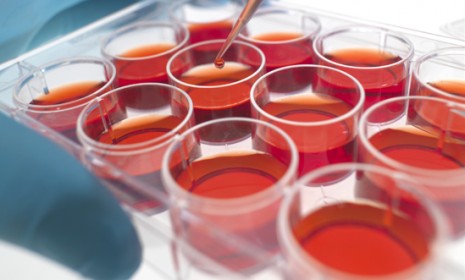Treating heart attacks with stem cells: The 'biggest breakthrough' yet?
Researchers are thrilled after discovering that damaged heart muscles can be repaired and strengthened with an injection of cardiac stem cells

A free daily email with the biggest news stories of the day – and the best features from TheWeek.com
You are now subscribed
Your newsletter sign-up was successful
Here's one way to mend a broken heart: Researchers from the University of Louisville, Kentucky, used cardiac stem cells to repair the damaged heart muscles of patients who had experienced severe heart attacks. Some call the findings, which were published in the journal Lancet, the field's "biggest breakthrough in a generation." Here's what you should know:
Wait, this treatment helps after a heart attack?
It does. Usually, the recovery phase after a heart attack is dangerous because of the possibility of heart failure, says Britain's Telegraph. Heart failure — which is often linked with heart attack victims, but can strike other people, too — "occurs when a damaged heart is weakened and unable to pump enough blood around the body." This treatment helps reduce that risk.
The Week
Escape your echo chamber. Get the facts behind the news, plus analysis from multiple perspectives.

Sign up for The Week's Free Newsletters
From our morning news briefing to a weekly Good News Newsletter, get the best of The Week delivered directly to your inbox.
From our morning news briefing to a weekly Good News Newsletter, get the best of The Week delivered directly to your inbox.
How does the treatment work?
It uses cardiac stem cells — taken directly from the heart — to repair the organ. "Cardiac stem cells can renew themselves and can form one of three types of cell that make up heart tissue," says Jessica Hamzelou at New Scientist. Researchers hypothesized that injecting stem cells directly into damaged areas might help improve the heart's recovery after an attack. In this new study, researchers extracted stem cells from the hearts of 16 patients during bypass surgery, then "multiplied them in culture and injected them back into each original patient's heart" four months later.
And this helped them recover?
It did. When controlled against patients who received standard care, the 16 patients demonstrated "striking" improvements. Their "pumping efficiency" was noticeably better, says the Telegraph, and surgical scars even shrank. After a year, eight of the patients saw a 12 percent improvement in pumping efficiency — triple what researchers initially expected.
A free daily email with the biggest news stories of the day – and the best features from TheWeek.com
Why is this such a big deal?
"It's long been an article of faith that human heart muscle, once damaged, cannot regenerate," says Eryn Brown at the Los Angeles Times. This study proves that not only can the heart be repaired, but that with a little assistance, it can repair itself using its own cells. That's very good news, as an estimated 6 million people in the U.S. experience heart failure every year.
Sources: LA Times, New Scientist, Telegraph
-
 The ‘ravenous’ demand for Cornish minerals
The ‘ravenous’ demand for Cornish mineralsUnder the Radar Growing need for critical minerals to power tech has intensified ‘appetite’ for lithium, which could be a ‘huge boon’ for local economy
-
 Why are election experts taking Trump’s midterm threats seriously?
Why are election experts taking Trump’s midterm threats seriously?IN THE SPOTLIGHT As the president muses about polling place deployments and a centralized electoral system aimed at one-party control, lawmakers are taking this administration at its word
-
 ‘Restaurateurs have become millionaires’
‘Restaurateurs have become millionaires’Instant Opinion Opinion, comment and editorials of the day